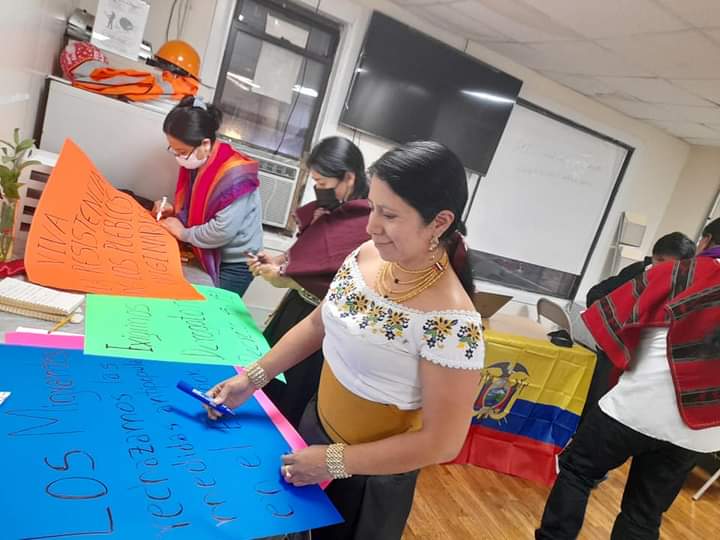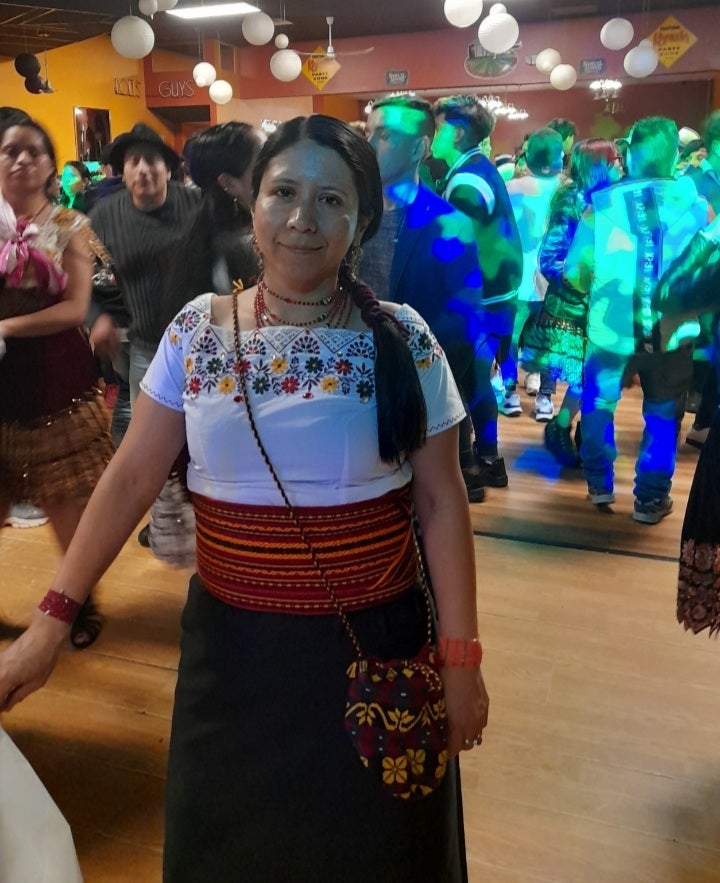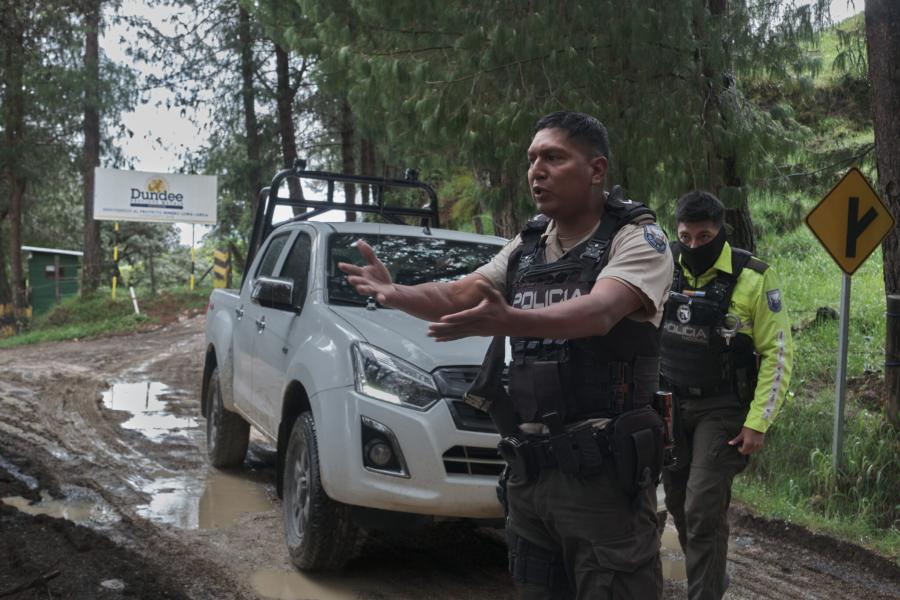
By Olga Tene Cayambe (Puruwa)
In June 2015 I came to the state of New York for the second time, as a visa holder. Upon arriving in this country from Ecuador I saw economic opportunity, so I decided to stay to establish myself and start a new life. I started from scratch, with my first job cleaning houses. Later, from Monday to Thursday I worked at a restaurant called Española, and on the weekends I worked on my own business selling handicrafts.
My first suppliers were, and continue to be, artisans from Saraguro, Puruwa, and Otavalo Peoples in Ecuador. After a year and a half, I decided to quit my job at the restaurant to dedicate myself full time to this business. I also decided to organize and connect with other spaces. My first approach and collaboration was with the Intercultural Voice of Migrants Radio, “El Tambo Stereo,” with two different programs every weekend. The first one is called “Kawsaymanta,'' which is an intercultural Kichwa, English, and Spanish-language program. The second one is "Ancestral Health," which talks about the medicinal properties and benefits of plants by doing live interviews with colleagues who are involved in alternative medicine.
During this process of establishing myself with my work and being part of the radio program in New York, I still felt an emptiness and the need to participate in organizational movements, especially with the migrant community of Peoples from Ecuador. When I lived in Ecuador, I was an active militant and was linked to various groups and social activists.
Starting in 2017, I began to join different organizational groups and cultural activities, first getting to know the different spaces and the ideological, political, social, and cultural positions of my colleagues. Through this direct contact, I heard familiar stories of other migrants; they told me about when they arrived in the United States, risking their and their families’ lives.

Many people do not achieve the American dream just by crossing the border between Mexico and the United States. From their countries of origin, a journey full of fears and frustrations begins. Then, when they finally reach their goal, they have to adapt to another daily reality. Many are mortgaging their properties, taking loans from banks or cooperatives, remaining in debt and working, dedicated to paying off their debts. For the newcomers, it’s even worse; they must take whatever work they can find to cover rent and expenses. The hardest thing is when winter comes and they have to work in temperatures as low as -20℃, and in the summer with an infernal heat of up to 40℃.
The highly variable and drastic weather and high cost of living in New York keeps immigrants in constant affliction and sorrow. When we talk about the high cost of living, many can only afford a shared room in a home where three or more families often live. For a single person, the cheapest rent is around $600 plus the cost of bus fare, food, and other expenses.
The basic salary in the state of New York in 2022 is between $13-20 an hour. To get $25 an hour, experience and other qualities are required. This salary is based on house cleaning, restaurant work, laundry, child care, and other similar tasks. The salary for builders, gardeners, plumbers, mechanics, painters, and bricklayers is between $18-35 per hour, depending on experience; however, those jobs are usually taken just by men. It is not uncommon for people to have more than one job, one at night and one during the day, in order to pay off their debt. They may only get 2-3 hours of rest per day. Newcomers often don't last long, either due to lack of experience, labor exploitation, or the extreme temperature changes.
When immigrants start taking the path to settling in this country for economic reasons, their identity as Native Peoples gradually fades. The hustle and bustle, stress, and lifestyle makes them lose interest in their cultural identity. Likewise, in their work activities, they are generally not allowed to wear traditional clothing. They stop speaking their Indigenous languages because the priority to survive in their activities and communicate is to learn English.
Sometimes immigrants hide their identity and culture, such as their clothing, language, traditional foods, ancestral medicine, and traditions and customs, due to lack of self-esteem—particularly the people that come to the United States from Sierra Centro los Puruwaes and Sierra Sur of the Canaris. I remember that in the first years that I attended cultural activities with my clothing from the Puruwa people, many asked me if I was from the Otavalo people. That made me think that the Otavalo people living in the United States are the ones who, with their music, art, and clothing, have made themselves known and have even been recognized as ambassadors of the culture of Ecuador.

Faced with this loss of identity and traditions of the Indigenous Peoples and nationalities of Ecuador residing in the United States, there is a need to create and strengthen small organizations that bring together their Peoples. One such organization is SARUSA of the Saraguro Peoples. They carry out cultural activities like the Kapak Raymi festival. Likewise, the Canaris and Puruwa people have celebrations, with the most important being Pawkar Raymi. For the Otavalo, the most important festival is Inti Raymi. There are other migrant communities that are increasing in number, such as Salasaca, which is organizing itself to hold traditional celebrations such as the Day of the Dead.
The Confederation of Indigenous Peoples and Nationalities of Ecuador in the United States (CONEUSA) brings various Peoples and nationalities of Ecuador together. We have been carrying out cultural, political, and social activities, such as the first meeting of Peoples and nationalities residing in the United States. In addition to socialization, we have organized live dialogues with the migrant community; sit-ins and banners during the 2019 uprising in Ecuador; press conferences and visits by the leaders of Ecuador; and visits from Kichwa doctors for the migrant community during the 2020 pandemic, as well as a variety of activities carried out on the agenda of CONAIE, which is our mother organization in Ecuador.
Organizing in CONEUSA requires a lot of conviction and dedication as well as time and money to carry out the different social and cultural activities. These structures are vital so that we Indigenous Peoples do not lose our way of organizing ourselves, and so that we can strengthen and promote the feeling of collective action. Because when we migrate, our traditions, our customs, and our historical memory that crosses borders must migrate with us.
--Olga Tene Cayambe (Puruwa) is Director of Culture and Communication at CONEUSA (Confederación de Organizaciones y Nacionalidades del Ecuador en Estados Unidos).



